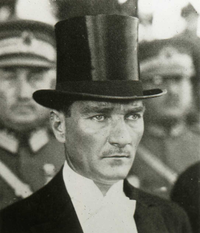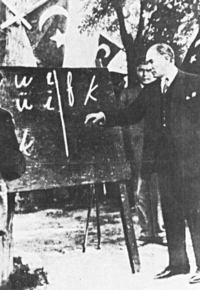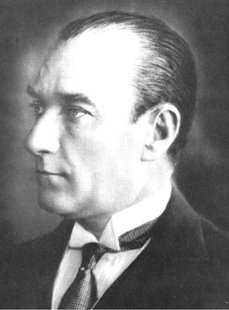
The political life of Mustafa Kemal Ataturk, the founder and first President of the Republic of Turkey may just be the blueprint for reform in the Muslim world. This is not to say his life was a blameless one, or that I hold the man in high esteem necessarily. Certainly, the Greeks and the Armenians have reason to despise Ataturk, in that the land on which the Republic of Turkey was established was aquired by Ataturk by making war on their respective countries.
However, one must admire the fact that, in forging a new nation, he saw the deficiencies of Islamic culture, and made a serious attempt at fixing the problems, by enacting reforms which we might do well to consider today.
Let us take a look at Ataturk's vision for an Islamic Democracy and progressive society which would be respective of human rights:
As the Republic's first president, Mustafa Kemal introduced a range of far reaching reforms which sought to create a modern, ostensibly democratic and secular state. Mustafa Kemal (instituted) a variety of wide-ranging political, economic and social reforms.
These reforms included:
Political Reforms
Abolition of the office of the Ottoman Sultan ruling since 1218, sending the last members of the House of Osman out of the country, and therefore giving the Turkish nation the right to exercise popular sovereignty via representative democracy (November 1, 1922)
Proclamation of the new Turkish state as a republic - Republic of Turkey (October 29, 1923)
Abolition of the office of caliphate held by the Ottomans since 1517 (March 3, 1924)
Please note here, then, that Ataturk proclaimed a Republic, in other words a government of the people, for the people and by the people. This proclamation did not lead directly to a Democracy, but it seems to have been Ataturk's intention to truly empower the people of Turkey.
Second, let us also note that Ataturk banished the former leaders of the Ottoman Empire into exile. And, he did away with the Caliphate. In other words, he made a clean sweep of the old, and brought in the new. He demonstrated little sympathy for the "traditional values" of Islam, or its adherence to a government without a church/state separation.
This would be the equivalent of our having exiled all Islamists from Iraq and Afghanistan, and banning the institution of Sharia law.
Did we do that?
No.
Now, let's look at the social reforms Instituted by Ataturk:
Social Reforms
Recognition of equality between the sexes (1926 - 1934)
Reform of headgear and dress (November 25, 1925)
Abolition of titles and by-names (November 26, 1934) 
Adoption of international calendar, hours and measurements (1925 - 1931)
Yes, that's right, Ataturk banned the burqa. Well, not the burqa proper, but the traditional Islamic clothing such as the Hijab, and even the Fez, the pillbox hat that men traditionally wore. Why did he do this? As we read on, we will see that it seems that Ataturk had quite an appreciation for the role of individualism in the shaping of a true human-rights respecting democracy.
Well, who would of thunk it, huh? I mean, did we ban the burqa and the turban in Afghanistan? No.
And, why do you think Atatur did away with the traditional Islamic calendar, and units of measurement? Surely, they do not violate human rights. No, they don't. But, they do serve to help keep Muslims living in the own medieval corner of the universe. Simply put, they impede progress, and anything that impedes progress only serves to make tradition, no matter how malignant, seem all the more compfortable and inviting.
Now, let us look at reforms in the sector of justice:
Legal Reforms
 Granting of first partial (1930), then full political rights (right to vote and be elected to parliament) to women (December 5, 1934), well before several other European nations. See Timeline of women's suffrage for more information.
Granting of first partial (1930), then full political rights (right to vote and be elected to parliament) to women (December 5, 1934), well before several other European nations. See Timeline of women's suffrage for more information.
Closure of Islamic courts and the abolition of Islamic canon law (1924 - 1937)
(That would be Sharia, my friends).
Transfer to a secular law structure by adoption from Swiss Civil Code and other laws (1924 - 1937)
Introduction of the new penal law modeled after Italian Penal Code (March 1, 1926)
Complete separation of government and religious affairs and the inclusion of the principle of laïcité in the constitution (February 5, 1937)
So, how is it that Mustafa Kemal Ataturk had the foresight, and the belief in Democratic principles to know that he would have to ban Sharia, that he would have to make sure that women had full equal rights, that he would have to do away with the burqa?
Why did Ataturk know all this, and yet our leaders do not?
How is it that we, who instituted drastic change in Germany and Japan in the wake of WWII by banning portions of the Japanese and German mythologies and state religions, do not understand that we need to do the same now, when the stakes are even higher, for us, and for the 1.2 billion people living under the oppression of Islamic totalitarianism?
What has happened to us that we have lost the courage of our convictions, of our belief that all men are created equal? What has happened to us that we don't understand the lessons of our own history, in WWII, and in the American Civil War, where we remade the society of the American South? What has happened to us that the President of the Republic of Turkey, circa 1930, had bigger vision for human rights and indiviualism than we do?
Listen, I am no expert in history. I may be getting some of this wrong about Ataturk. If I am, please let me know. My field of study was Philosophy and Literature. Therefore, I believe I have a decent grasp of the raw power of ideas. And, it is my opinion that Ataturk had it right in Turkey, and we have it exactly wrong in Iraq and Afghanistan.
I can assure you that, if I am right, this will have very tragic consequences. The world will lose what little trust they still have in American goodness and vision. The Europe Union - and its Machiavellian vision of the world, which is willing to get in bed with any surging fascism as long as it serves the interests of the French and German pocketbook - will be granted a victory. And, finally, time will have been lost in the progress towards resolving this war, and that only means that the momentum will have gone to the other side, the side which is now developing nuclear weapons with which to kill tens or million, if not hundres of millions of human beings.
What are we to do? I suggest we crack open our fucking history books, and use them as mirrors to remind us of who the fuck we are supposed to be.
6 comments:
Great post, Pastorius! Right on!
Send it to Bush.
Thanks, WC. That means something, coming from you.
Turkey has always been a place where the two choices were always Kemalism (a variant of authoritarianism) and Islam.
Now, despite the impressive list of reforms, Turkey is backsliding back to Islam. Islam is like an unstoppable force of nature in that part of the world, and it pains me to say that.
Problem is, Kemal was but one man, long since dead, and his influence will unavoidably wane over time, as it has already.
My idea here is that we, the West, have to do the same thing. Well, we should have done the same thing.
We didn't, and now we will suffer.
May a Turk interject?
I agree with the main thrust of your argument: that it appears Islamic fundamentalism can only be defeated by a head-on struggle at every level, without compromising on any "detail".
However, M. K. Ataturk had one major advantage the West does not have in, say, Afghanistan. He was a *local* hero, the orphan made poster boy of the Dardanelles campaign and the undisputed organiser of the victory in our War of Sovereignty. Even the pious (by which I do not mean the extremists) by and large acquiesced - after all, he was also the "warrior gazi", who had seen the backs of the French, British, Italians and Greeks. And if the Gazi Pasha had a penchant for drink or western ways, well, you couldn't very well deny him - and maybe he was onto something?
Plus, Turkish women had made a vital contribution to the war(s) - it would have been inconceivable to have them return to their pre-war legal status.
And then, let us not forget: the Turkish experiment started a century before Ataturk. He merely accelerated change dramatically.
From an Ataturk-adoring Turk,
Emre Yigit
Even I have come to admire Ataturk. He was an impressive figure, and I believe strong wills are needed in forging or reshaping nations. For those of you who know I'm half Ionian Greek, that's probably Greek. To those who are Greek , you'll probably kick my ass. But it's true. Ataturk took the reins when it needed to be done.
I wrote ages ago about Ataturk and Sherman and their visions for war needing to be revisited. The demons of my Greek-a-Billy past are at many times my greatest heroes now. I guess I'm a nationalist (gee, ya think? PIM'S Ghost) and not a good little secessionist after all.
Post a Comment